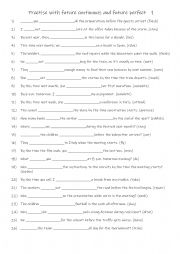
|
A2-B1 Practise with future continuous and future perfect 1
Students should practise the future continuous and future perfect because these tenses enable precise communication about future events. The future continuous describes ongoing actions at a specific time in the future, such as "I will be preparing dinner at 7 p.m. tomorrow," helping students discuss future activities in progress. The future perfect...
Level: elementary
Age: 9-100
Type:
Downloads: 115
|
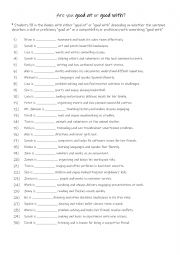
|
A2-B1 Are you good at or good with?
Students fill in the blanks with either good at or good with depending on whether the sentence describes a skill or proficiency good at or a compatibility or proficiency with something good with. Answers on page 2.
Level: intermediate
Age: 10-100
Type:
Downloads: 112
|
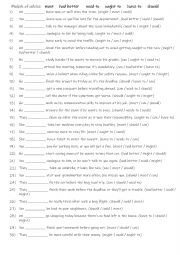
|
A2+-B1+ 6 Modals for advice
Students read the sentences and complete the gap-fill with the most suitable modal of advice: must,had better,need to, ought to, have to & should. Answers on page 2.
Level: intermediate
Age: 8-100
Type:
Downloads: 109
|
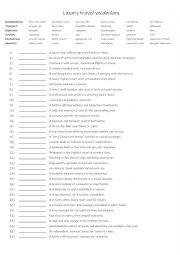
|
A2+-B1 Luxury travel vocabulary
Students familiarise themselves with the 30 words and their meanings, then they read the definitions to work out and write in the space provided which one is being described. Answers on page 2.
Level: intermediate
Age: 9-100
Type:
Downloads: 130
|
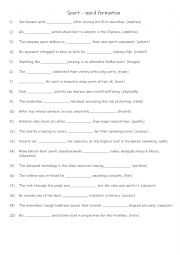
|
B1+ Sport - word formation
Understanding word formation allows students to expand their vocabulary, enabling them to express themselves more precisely and creatively. Knowing how to manipulate words helps them create varied sentence structures, making their writing more engaging and dynamic. Mastering word formation is key to achieving higher levels of language proficiency, ...
Level: intermediate
Age: 9-100
Type:
Downloads: 129
|
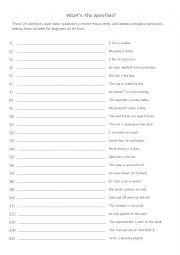
|
What�s the question?
The 25 sentences cover basic vocabulary, present tense verbs, and common everyday expressions, making them suitable for beginners at A1 level.
Students read the answers, then write a suitable question to get the given answer. Possible answers on page 2.
Level: elementary
Age: 10-100
Type: worksheet
Downloads: 131
|
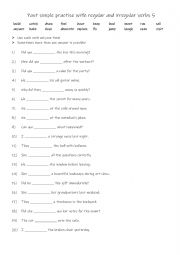
|
Past simple practise with regular and irregular verbs 5
Students first familiarise themselves with the 20 verbs. Then they complete the gap-fill with the correct form of that verb. Answers on page 2.
Level: elementary
Age: 7-100
Type:
Downloads: 140
|
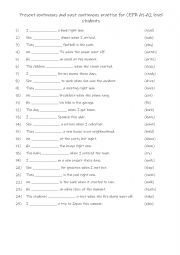
|
Present continuous and past continuous practise
Present continuous and past continuous practise for CEFR A1-A2 level students. Students read the sentences and look for key words to see if the given verb needs to be present or past formation. Answers are on page 2.
Level: elementary
Age: 10-100
Type:
Downloads: 120
|

|
5 Modals of deduction - used to make guesses or deductions about past situations. 2
Students should learn modals of deduction because they are useful for expressing logical guesses or assumptions about past situations, helping speakers show how certain or uncertain they are. These modals, such as must have, might have, could have , and can�t have, make speech sound more natural and fluent, improve communication and reasoning ski...
Level: elementary
Age: 9-100
Type:
Downloads: 106
|
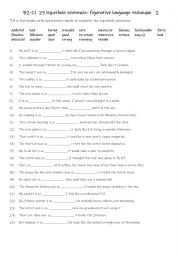
|
25 hyperbole sentences- figurative language technique 2
Learning hyperbole enhances creativity and helps students to express ideas vividly, making their writing more engaging and impactful. It improves communication skills by adding humour or emotional depth, while also fostering a better understanding of cultural and literary nuances. Recognising and using hyperbole sharpens analytical thinking, as stu...
Level: intermediate
Age: 12-100
Type:
Downloads: 124
|












